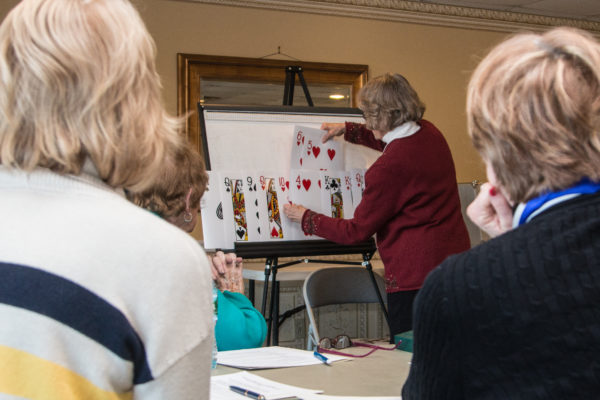by Brenda Stone
Aging is inevitable, but, as Dylan Thomas said, that does not mean you must “go gentle into that good night.” Recent research has shown that brain cells don’t necessarily die off as you age. In fact, your brain can actually form new cells, as well as make new connections among existing cells, given the right environment. And The Second Half provides that right environment in many ways through its various study groups, but one way that has received a lot of attention from researchers lately may surprise you – it is playing the game of bridge. You may be doing it for fun, but the brain exercise you get is special.
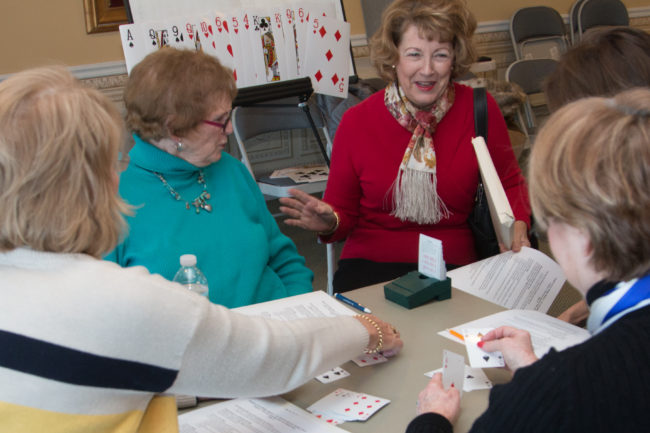 Two components of bridge promote healthy aging and therefore make it an ideal game for senior citizens. Bridge provides (1) a cognitive workout and (2) an opportunity for social interaction. The combination of these two key components sets bridge apart from many other leisure-time activities as an ideal environment for fostering an active, healthy brain.
Two components of bridge promote healthy aging and therefore make it an ideal game for senior citizens. Bridge provides (1) a cognitive workout and (2) an opportunity for social interaction. The combination of these two key components sets bridge apart from many other leisure-time activities as an ideal environment for fostering an active, healthy brain.
How will playing bridge help your mental acuity? Several cognitive skills are required to play bridge effectively:
- Concentrating on the game before you without getting distracted is essential so that you can give your full attention to the bidding process, to the cards in your hand, and to the cards that are being played.
- Organizing and sequencing the cards in your hand are necessary before you begin the bidding process.
- Having a reliable short term/working memory is very important when playing bridge. Remembering what was said during the bidding phase of the game and what cards have been played are assets as you attempt to win your contract or set your opponents.
- Reasoning and problem solving skills are needed to overcome sticky situations when playing bridge. For example, you need to take 10 tricks to make your contract, but you see only nine winners. What do you do?
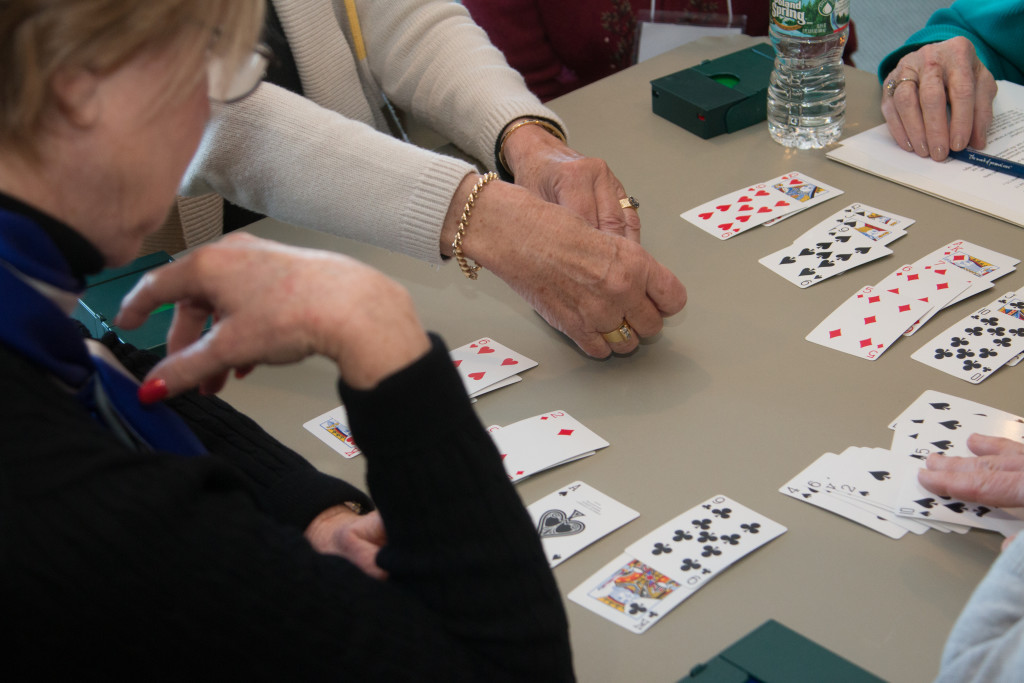 And bridge helps you improve your processing speed, as well as your patience. When playing a hand of bridge, you need to quickly identify and locate the correct card to play. But perhaps others at the table need more time to assess their hands and play a card; and that’s when patience is needed.
And bridge helps you improve your processing speed, as well as your patience. When playing a hand of bridge, you need to quickly identify and locate the correct card to play. But perhaps others at the table need more time to assess their hands and play a card; and that’s when patience is needed.
The results of a 2014 study, which was cited in the March 2015 AARP Bulletin, found that playing card and board games can help older people retain their mental sharpness. Another study, particularly relevant to bridge, concluded that older adults who play bridge score higher on working memory and reasoning measures than those who do not play bridge. Now, aren’t those great reasons to play the game of bridge?
But there’s an added component that makes bridge an even more compelling leisure activity, and that’s the opportunity for social interaction. 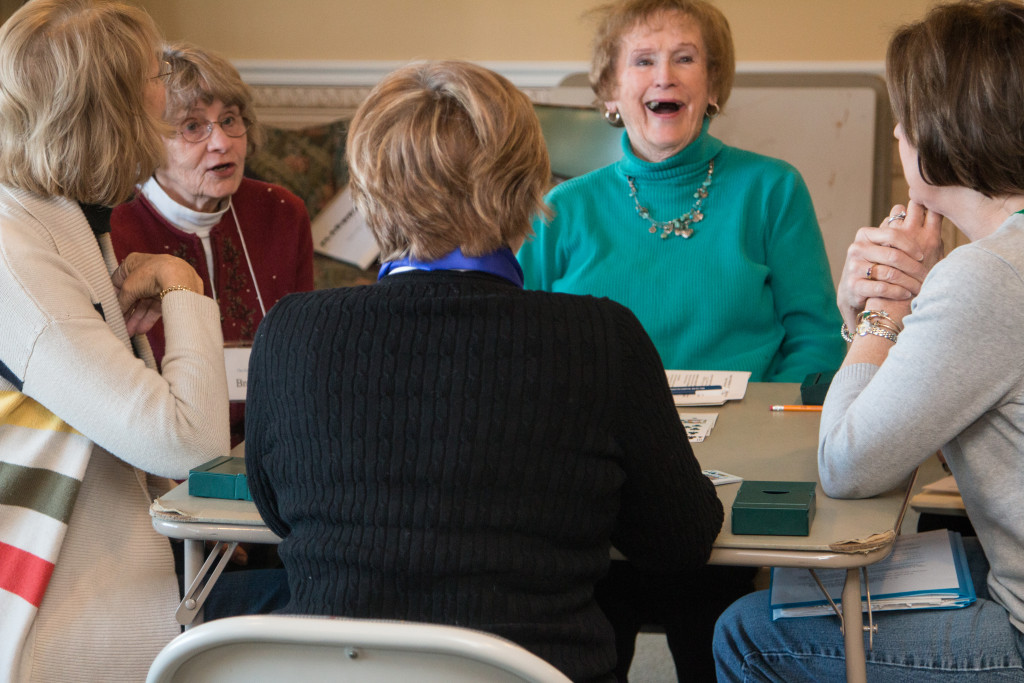 In a 2009 article in The New York Times, neurologist Dr. Claudia Kawas reported that although it’s very important to keep challenging your mind, there is some evidence that a social component may be a crucial factor in healthy brain aging. Research studies indicate that senior citizens with higher social activity live longer and have less cognitive decline than those with less social interaction.
In a 2009 article in The New York Times, neurologist Dr. Claudia Kawas reported that although it’s very important to keep challenging your mind, there is some evidence that a social component may be a crucial factor in healthy brain aging. Research studies indicate that senior citizens with higher social activity live longer and have less cognitive decline than those with less social interaction.
Although playing chess and working crossword and Sudoku puzzles are cognitively stimulating, 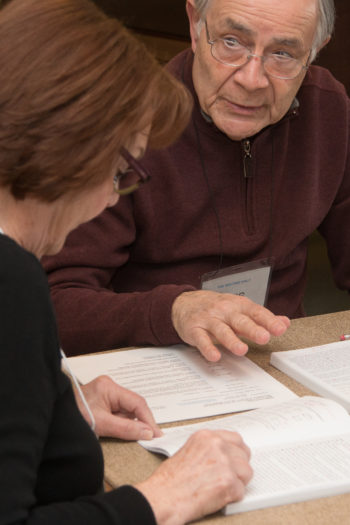 they are solitary activities and don’t involve the social interaction inherent in the game of bridge. When playing bridge, four people sit down at a card table and interact with one another. This interaction ranges from introductions and small talk to discussing the complexities of a particularly challenging hand. Throughout the game, you and your partner work together to achieve a common goal, which can be either making your contract or stopping your opponents from making their contract. The bottom line is that playing bridge provides the opportunity for social interaction, and individuals who interact socially not only live longer than those who become isolated but also have improved immune systems.7
they are solitary activities and don’t involve the social interaction inherent in the game of bridge. When playing bridge, four people sit down at a card table and interact with one another. This interaction ranges from introductions and small talk to discussing the complexities of a particularly challenging hand. Throughout the game, you and your partner work together to achieve a common goal, which can be either making your contract or stopping your opponents from making their contract. The bottom line is that playing bridge provides the opportunity for social interaction, and individuals who interact socially not only live longer than those who become isolated but also have improved immune systems.7
So, instead of going “gentle into that good night”. . .
“rage, rage against the dying of the light.”
You have the opportunity to make physical changes in your brain by learning a new skill. Why not make that new skill bridge?
Editor’s note: The Second Half offers Beginner, Intermediate, and Slightly More Advanced Bridge, all within friendly, supportive environments. Please consider joining one of the three bridge study groups in the fall of 2015.
Brenda Stone holds a Ph. D. in psychology and has career experience both as a teacher and as a school psychologist. She is teaching beginner and intermediate bridge next fall. Catherine Williams will be assisting her in Intermediate Bridge. Al Humphrey is teaching Slightly More Advanced Bridge. Brenda and Al are certified by the American Contract Bridge League as accredited bridge teachers.
